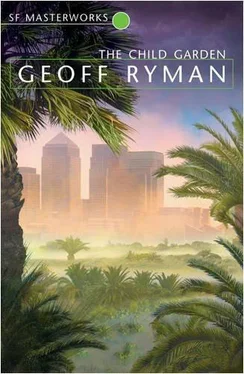‘Oh did those feet in ancient times… ’
‘Swing low… ’
‘Silence, silence from which we all come…’
The many songs of mourning seemed to compete. Children stood with their hands raised towards heaven, keening, warbling, tears smeared over their faces. Men stared as if stunned, glancing back behind them at the burdens in the bottom of the boats.
From out of the Estate of Remembrance, women covered in white waded out into the water. They wore white masks to hide their faces. They held out their arms and with a start, the orphaned children shifted themselves and tried to lift up the hammocks. The women in white took them on their shoulders, and bore the loads on their shoulders. As the hammocks were taken from them, the mourners threw flowers into the air. They called goodbye, they shouted out names, every name it seemed that it was possible to call, as if all the world were dying at once. The women in white stepped up onto the salty banks, their legs glossy with mud. They walked with quick jabbing steps up the slopes of the kilns.
‘Go around! Go around!’ they shouted, almost as if in panic, to Milena’s boatboy. They made circular motions with wet purple hands. The boatboy shook his head, and pointed between the kilns, and thrust the boat forward in that direction, gliding between masses of rotting flowers. The white petals had gone slimy and brown. It was the flowers that stank of death, rank and gaseous. Milena coughed. Smoke drifted low over the water, pitch black and sharp in the nostrils. The boat surged into it: it stung Milena’s eyes and made her weep. Then the boat was through it, there was a freshening breeze in her face, and Milena looked up and saw her new home.
It rose, like a hangar over the water, huge and arched, with four buttressing towers of bamboo at each corner. All the light about it was golden, filtered through smoke. It was made of reed and was a kind of Ark, floating on the surface of the estuary. A wide deck of reed surrounded it, with floating moorings extending out into the water.
The punt sighed up onto the artificial bank of reed, and the boy slipped over the side of the boat, and pulled it up closer to a small, dry platform. He helped Milena up onto it. He carried her one bamboo suitcase.
‘I have never seen inside such a place,’ he whispered.
‘Neither have I,’ confided Milena.
A tiny but rotund woman came down the sloping reed bank towards them.
‘Are you the theatre person?’ the woman asked, voice quailing as she walked towards them. Her face seemed settled in gloom.
‘Yes. I am. My name is Milena Shibush.’ Milena held out her hand, but the woman stopped where she was on the bank and would come no closer.
‘I am Ms Will. There was no one else to do it, so they left me here to show you around.’ She glanced at the boatboy. ‘I suppose he will have to come in too. Isn’t it awful about that horrible smoke? And the singing!’
Without a handshake, Ms Will turned around and led Milena towards the Tarty house.
The sliding-panel doors had been left open. The walls were a series of sliding panels that could be shifted according to the weather. Ms Will led Milena through them into a large, covered courtyard.
Inside, there was a cathedral hush. Arches of reed rose up and over them. Sunlight leaked through the walls, as if through a sieve. Sunlight burned in brilliant pinpricks, and spilled in rays on the floor. The floor was made of woven reed. Ahead of them was a tumble of bamboo boxes coated in plaster, and corridors and steps. There was a smell of cooking.
‘All the quarters are separated from each other. There’s some kind of resin between the walls. Dead Space, they call it, to absorb noise. At least we have some privacy. You are up here.’
They climbed a bamboo staircase up a scaffolding of stilts. Milena’s rooms clustered over a water tank. Milena’s door was a series of sliding screens. Ms Will pulled them back, one after another.
Milena’s rooms were like a series of lacquered bamboo boxes. The winter screens had been folded back, the windows were open, there was a gentle breeze. There were reed carpets as soft as sweaters over the thick reed floors. There were summer shutters that had been woven into illustrative shapes of flamingoes and herons and wading farmers. There were beanbags on the floor, there was a desk with a chair, there was a kitchen with a charcoal stove and a hibachi, there were charcoal stoves in every room. Behind a screen, there was a bathroom, a bathroom all of her own with a huge resin tub, and a trough of warm water and a pan for scooping it out and pouring over herself in great gushing plashes. There was a throne toilet, a bamboo box.
As Milena walked from room to room she cried aloud. ‘Oh look at this! Oh look at this!’ overwhelmed with gratitude at each new revelation. The boatboy walked hushed behind her.
‘I have never imagined a house like this,’ he said in awe.
Milena ran to one of her windows, and looked out. There was a patchwork quilt of green squares, brown pools, ridgeways, stiltways, a crowd of canoes where there was a floating market. There was a great stretch of water. There were flamingoes. There was the sound of wind in reeds, of birds perched on fenceposts.
‘I can’t believe I will live in such a place,’ said Milena. Here, she thought, I can rest. Here I can be safe.
There was the massed singing of Remembrance, and the drifting shadows of smoke.
It only took one week for Thrawn McCartney to find her.
A week later, Milena lifted up the lid of her new bamboo box toilet and there was Thrawn’s face inside it.
Here it begins, thought the Milena who was remembering. This is the July, this is the August, before I went into space. I’m going to have to remember this, too. All part of the story. And the Consensus wants a story.
Thrawn giggled. ‘Just a head in the head,’ she said. ‘If you’re going to use it, Milena, you’re going to have to use it with me in it. I think that’s a pretty good picture of what our relationship’s been all along, don’t you?’
Milena stared in horror. The full horror took some time to sink in.
‘Pretty new flats courtesy of the Party are no defence, Milena. No defence against a bad conscience.’
‘You’re the one who dumped on me,’ said Milena.
‘It’s funny,’ said the head. ‘How people who commit injustice always have to fry up one that’s been done to them. Otherwise they wouldn’t be able to do what they do.’
Milena closed the lid. She walked through her beautiful lacquered boxes, surrounded by the Dead Space. There was a blaze of sunlight on the floor. It was the Summer of Song, the Summer of Light. It hadn’t rained in two months.
A hologram of a squat toilet was in the centre of the front room. It was the old kind, that most people had to use, a hole in the floor with footrests. ‘Yoo hoo. Milena!’ called a hollow voice from inside it.
There was also the carcass of a water buffalo on the floor. It had been skinned and gutted. There were pink and white ribbons of fat and flesh. The carcass stood up and limped, on stumps, headless, towards Milena.
‘Here I am,’ the carcass sang and whooped. ‘A new Milena Shibush production.’ It spun around on stumps, and then fell. ‘Holograms courtesy of some female or other we can safely chew up into Coral.’
The carcase sprouted flowers from the stump of its neck. They were generic flowers, blearily imagined. But the flowers were bleeding.
‘Poor, poor Milena. Such a hard time she’s having.’ There was a chorus of sentimental sympathy in the air all around her. ‘Ahhhhhhhhhh.’
Milena saw something out of the corner of her eye, and turned around, and there was Thrawn, holding out a knife towards her.
Читать дальше












